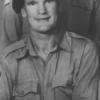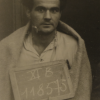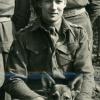In the words of Johnny Peters 30 June 2008
Preparation for Operation Market Garden
Johnny and his unit were sent to Burford in Oxford in August 1944 and the whole Battalion were billeted in pig sty's on a farm close by. During this time 15 airborne operations were planned and subsequently postponed, with the final one, Operation Market Garden scheduled for the 17th of September. Early that morning, they were transported to Broadwell Aerodrome. ‘Whilst there I was sent out with a Corporal Heaton to search for two of our company who had absconded during the night, needless to say our search was fruitless’.
Operation Market Garden
‘We boarded a Horsa Glider, chalk number 161 and were introduced to the pilots Lt Colonel John Place and a Lt Ralph Maltby. Only 14 of our platoon emplaned. We crossed the North Sea and broke out into singing the hymn ‘Lead us Heavenly Father Lead us’ possibly as a result of remembering those 300 glider troops who were drowned during the invasion of Sicily. At least we could look down below us and see the Air Sea Rescue boats in attendance which was a sobering thought. Upon crossing the flooded part of Holland where there was no flak in evidence and being the leading glider in the armada, it was different. We reached drier ground where heavy ack ack fire was brought to bear on our glider. It was good to see the rocket-firing Typhoons of the RAF bearing down in front of us and firing their rockets. Shortly after that a cry went up from the rear of the glider: ‘The tail’s coming off!’ This was relayed to the pilot who sent Lt Maltby to investigate; he came back with a grin on his face as all he found was fabric flapping in the wind. We started to experience large accurate ack ack fire when a large explosion hit the cockpit. There was a smell of cordite, and unfortunately Lt Maltby was killed outright. The glider started to do all sorts of twists and turns. My immediate thought, and that of the others was, what if the pilot should be killed or wounded?, needless to say that on approach to our landing zone S, we were met with small arms fire, with bullets ripping through the floor of the Horsa, but miraculously only one soldier, Private Hughes, was hit in the leg. Lt Colonel John Place did a copybook landing and the glider chalk 161 was the first to land.
Landing Zone ‘S’
‘As the remaining gliders were landing on the LZ, some were overshooting and crashing into the woods that were adjacent to the LZ, causing deaths and serious injuries to the pilots and the glider troops. B Company took up immediate defensive positions on top of the railway embankment to guard the drop zone X, as we waited for the arrival of the Parachute troops. They landed and B Company under the command of Major T Armstrong proceeded along the road towards Renkum. We met no opposition until we reached the outskirts where we bumped into a German armoured vehicle. It is hard to say who was the most surprised. After an exchange of fire we proceeded to our objective which was the local brickworks, which is still standing to this day.
Digging In
‘Fellow sniper Private Eric Borders and I dug in below some clay bogies which ran along the railway line and brewed up. During the night we heard foreign voices which we assumed could be Poles. At this time we were stood to. We heard the creaking of the barbed wire fence to our immediate front. Sgt Watson fired a vary pistol light and gave the order to open fire as there were German soldiers trying to get into our positions, possibly not knowing that we were in fact already there. We were ordered to vacate out trench and then take up positions behind some wheels of clay bogies as there was no time to further dig a slit trench.
German Patrol Engagement
‘During stand to a German patrol was advancing along the road directly in front of our positions led by an officer who was obviously unaware of our position. He halted his patrol and checked his map and waved in our direction. Sgt Watson again gave the order to open fire. They were just like sitting ducks, and several perished under this unexpected fire. Those that escaped took up positions in houses alongside the road, where we engaged them all morning, suffering no casualties. They then shelled our positions and the ammunition was getting low. Worse was to follow as we were told that now we were completely surrounded and no communication could be got to the Battalion HQ. Just after midday the order was given to breakout. We proceeded along the river bank leaving a rear guard to enable us to get away.
High Point
‘We arrived with no further contacts with the enemy at a place called the Westerbowing. This was the highest point in the whole area and dominates the area of the Rhine and the south bank. It was a few hours later when the Germans finally found our location and a contact began which lasted for three days, with continuous shelling day and night. They probed our positions by using night patrols and we suffered a lot of casualties. Added to that fact, we had no rations however we did manage to get some water.
‘The position for B Company again became un-defendable and we were not that same fighting force who held the position three days earlier. The order was again given to withdraw, and the remnants were sent to different Companies as reinforcements. I went to A Company for a short while, it seemed that we were always digging in, not knowing where we were, no food, and we were always in the open. We watched the supplies being dropped by our own aircraft, but sadly straight into the Germans hands.
Loss of Platoon Friends
‘14 Platoon had several of its members killed during this time, notably Sergeant Tommy Watson, L/Cpl Holdsworth, Pte Eric Borders, Pte Norman Manchester, Cpl G. Howe and Pte Cranswick. Only 2 returned home: me and Pte Brooke having successfully escaped across the Rhine to safety, which was out of a total of 25.’
In the words of Johnny Peters, as told to Bob Hilton
Read More




Latest Comments
There are currently no comments for this content.
Add Comment
In order to add comments you must be registered with ParaData.
If you are currently a ParaData member please login.
If you are not currently a ParaData member but wish to get involved please register.